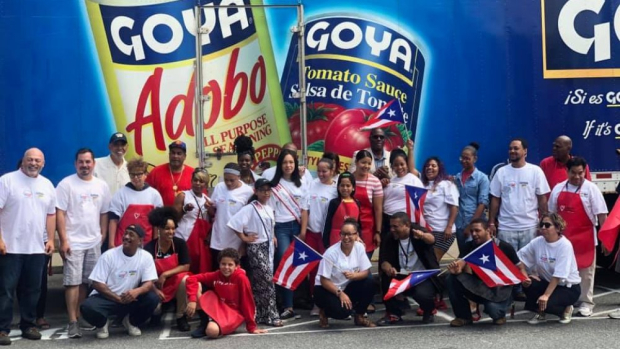Chances are good that if you open your pantry or your refrigerator, you probably have a Goya Foods product or two sitting on a shelf. You may even have a lot of it. Maybe this was a conscious decision — you're a brand loyalist who loves the Goya products — or maybe you bought the beans or rice (or any number of other foods) because it was a good deal. Either way, you probably never gave it too much thought before the company made the news in 2020 for remarks the company's chief executive, Robert Unanue, made about President Donald Trump when appearing at the White House for a rollout of the administration's Hispanic Prosperity Initiative. The ensuing boycott and counter-boycott flooded social media channels and every major news outlet, placing the food manufacturing company at the center of nearly every headline. Who could've imagined that beans would become politicized, driving purchases based on political party?
Regardless, there's more to Goya's history as a company than a few words spoken by the company's chief executive at a singular event. Here's what you really need to know about Goya Foods.
The founder of Goya Foods purchased the name from a sardine importer
Regardless, there's more to Goya's history as a company than a few words spoken by the company's chief executive at a singular event. Here's what you really need to know about Goya Foods.
The founder of Goya Foods purchased the name from a sardine importer
Goya Foods was founded in 1936 when Don Prudencio and Carolina Unanue, immigrants from Spain, by way of Puerto Rico, saw a potential market for selling Latin foods in the New York and New Jersey region. Unanue, who according to Grubstreet, was a fan of the artist Francisco Goya, purchased the name "Goya" from a Moroccan sardine-importer for $1. He figured that naming his company "Goya" would be easier for people to pronounce than if he were to use his own last name.
According to the company's website, Goya started by selling authentic Spanish products, including olives, olive oil, and (of course) sardines, from a storefront on Duane Street in Lower Manhattan. They focused on selling to local, Hispanic families, and gradually started distributing their products to bodegas in the area. They had a commitment to selling high-quality products that tasted fresh from the company's get-go, and soon coined Goya's long-standing credo, "If it's Goya, it has to be good."
The Goya Foods company expanded slowly
Given the Unanue family's Spanish heritage, it made sense that Goya Foods started out small by selling authentic Spanish foods, but in the 1900s, New York and New Jersey experienced surges in Hispanic immigrants from different countries, providing Goya with the opportunity to branch out into different types of Hispanic cuisine. According to a 2013 article in Forbes, when World War II ended, a wave of immigrants from Puerto Rico made their way to New York. This inspired Prudencio Unanue Ortiz to add yucca, plantains, and pigeon peas to Goya's product line. Then, when Cubans and Dominicans immigrated in the 1950s and 1960s, the company also added black beans, guava paste, and coconut.
This targeted, local marketing provided steady and consistent growth, allowing the company to expand throughout the Eastern United States by the 1980s. And as more Latinos continued to immigrate to the United States from Mexico and Central America, there was a greater population (of Latinos and non-Latinos alike) interested in consuming Hispanic cuisine. As such, the Goya Foods product line and distribution only continued to grow.
Goya Foods is the largest Hispanic-owned food company in the US
Goya Foods slow and steady (and smart) expansion over 80 years has paid off quite nicely for the brand, landing the company at the top of the food chain (so to speak) of Hispanic-owned food companies in the United States. According to an article in Forbes, Goya had revenues topping $1.3 billion in 2012 (up from just shy of a billion in 2010), which qualified it as one of the fastest-growing food companies in the United States, as well. It's a title they still hold today, as their numbers continue to grow right along with their product line.
Read More: https://www.mashed.com/228585/the-truth-about-goya-foods/


